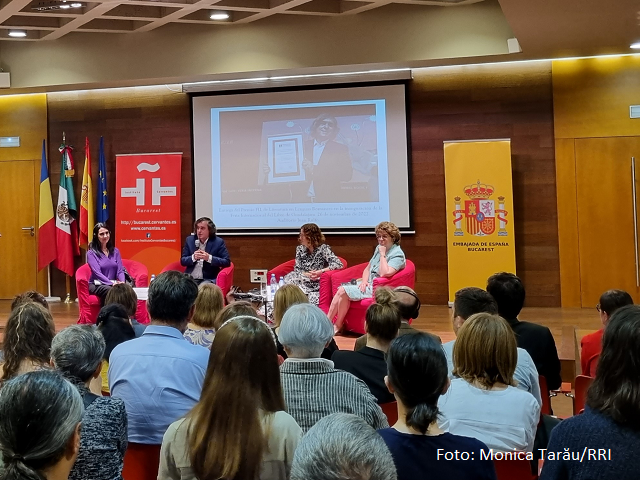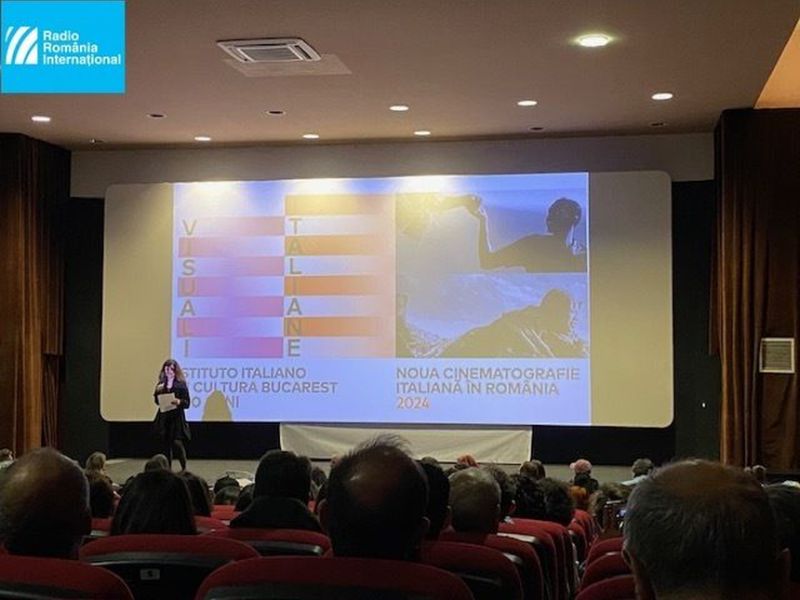Mircea Cărtărescu, awarded at the Cervantes Institute in Bucharest
The Cervantes Institute in Bucharest has hosted an event of special importance: a ceremony honoring writer Mircea Cărtărescu, the best-known contemporary Romanian author in the Hispanic world

România Internațional, 16.09.2023, 13:03
The Cervantes Institute in Bucharest has hosted an event of special importance: a ceremony honoring writer Mircea Cărtărescu, the best-known contemporary Romanian author in the Hispanic world. The event was occasioned by the awarding of the FIL Literary Award in Romance Languages, the 2022 edition, at the largest Spanish-language fair – the Guadalajara International Book Fair (FIL) – to the writer Mircea Cărtărescu.
The event organized by FIL Guadalajara and hosted by the Cervantes Institute in Bucharest was attended by journalists, writers, critics, as well as loyal readers of the Romanian writer. Dulce María Zúñiga, the Director of the FIL Literary Award in Romance Languages Carmen Mușat, the Director of Observator Cultural magazine, and Oana Fotache Dubălaru, literary critic, spoke about Mircea Cărtărescus work, whose Spanish version is signed by translator Marian Ochoa by Eribe and published by Impedimenta Publishing House in Madrid. “A complex writer, with a maximalist style, who fully fits into the tradition of universal literature, putting his readers from all over the world in front of dreamlike and existential questions”, having an “integrative, imaginative and dazzling work, combining fantastic and realistic elements, speculative identity construction, starting from a liminal and peripheral space towards a European landscape”
This is how the jury of the 2022 FIL Awards motivated choosing Mircea Cărtărescu from among eighty candidates. The FIL Literary Award in Romance Languages is the highest distinction of the Guadalajara International Book Fair and rewards a lifetime of literary creation. Carmen Mușat spoke about her experience as a member of the international jury of the FIL Prize for Literature in Romance Languages and about the relevance of Mircea Cărtărescus literature:
Track”: The family of Romance languages is very strong and it is not easy to choose when it comes to first-rate writers from France, Italy, Spain, in fact from all the Romance-language countries in Europe and, obviously, from Latin America . So that the fact that Romania was twice chosen for the FIL Prize – through its representatives, Norman Manea, in 2016, and MirceaCărtărescu, in 2022 – I think that says a lot about the value of Romanian literature and about the interest in Romanian literature that it is manifested by people from different corners of the world. Mircea Cărtărescu is rightly considered one of the worlds great prose writers. But to my mind ,Mircea Cărtărescu is also a poet who reshaped Romanian poetry. After his volumes, “Faruri, Vitrine, Fotografii” (1980) and “The Levant” (1990), literature in Romanian could never be the same. Cǎrtǎrescu revolutionized the language and the structure of poetry. And I think only 4 poets in the history of Romanian literature did that before him. So I am glad that the FIL jury chose Mircea Cǎrtǎrescu, because thanks to his special body of works a window is once again opened into Romanian literature, and this benefits all Romanian writers.”
Upon accepting the FIL Prize in November 2022 in Guadalajara, Mircea Cǎrtǎrescu spoke about poets and poetry: “We cannot imagine today a presence more absent, a destiny more dramatic than that of poets, who decide to devote their entire life to art. (…) I have never been anything but a poet… Poetry has enlightened my entire life. Even my novels are essentially poems. I have always written poetry as a form of freedom, of solidarity, of empathy for all people. I have written against wars and discrimination of all kinds.”
At the Cervantes Institute, Mircea Cǎrtǎrescu also discussed his fascination with Latin-American literature and this part of the world:
Mircea Cǎrtǎrescu: “I have been won over by this world, which I think is very familiar to Romanians, because Romanians are very much similar to Latin Americans, without doubt, both in terms of language, and in terms of their history. We have a similar record of dictatorships and unfortunately, the same rift between the rich and the poor. And, more importantly, we have similar, imaginative literatures, which I believe is the strongest connection between us. For us, the advent of Latin American literature in the 1960s was not that big of a surprise, because we also had a tradition of fantasy books, starting with Mihai Eminescu, carried on by Vasile Voiculescu and others, up to some writers in the 60s. So it was no surprise, but rather huge joy and a confirmation of the fact that true prose must have a core of poetry, a touch of the fantastic, an aura of the miraculous. And we found plenty of these in the works of Gabriel Garcia Marquez, Mario Vargas Llosa, Alfredo Bryce Echenique, Juan Rulfo, the great Mexican writer Carlos Fuentes, and many others. We have learned a lot from these authors, and we tried to follow in their footsteps while remaining ourselves, while filtering fantasy and the surrealism of this world through our own history and our own perceptions.”
Mircea Cǎrtǎrescu has published over 30 books, including “Theodoros,” “Travesty,” “Blinding,” “Solenoid,” “Nostalgia,” “Why We Love Women,” “Love Poems,” “Everything,” “Nothing,” “The Levant.” His works, translated into 25 languages, received prestigious awards in Romania and abroad: the Thomas Mann Prize (Germany, 2018), Prix Formentor (Spain, 2018), Premio Gregor von Rezzori (Italy, 2015), the Austrian State Prize for European Literature (2015), the Leipzig Book Award for European Understanding (2015), Premio Euskadi de Plata (Spain, 2014), the Grand Prix of the Novi Sad International Poetry Festival (Serbia, 2013), Spycher – Literary Prize Leuk (Switzerland, 2013), the Vilenica Prize (Slovenia, 2011).





























